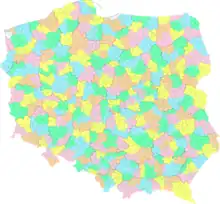| Warsaw Voivodeship | |||||||||||
|---|---|---|---|---|---|---|---|---|---|---|---|
| Voivodeship of the Polish People's Republic and Third Republic of Poland | |||||||||||
| 1975–1998 | |||||||||||
 The Warsaw Voivodeship within Poland, between 1975 and 1998. | |||||||||||
| Capital | Warsaw | ||||||||||
| Area | |||||||||||
• 1997 | 3,788 km2 (1,463 sq mi) | ||||||||||
| Population | |||||||||||
• 1975 | 2 154 700 | ||||||||||
• 1997 | 2 416 600 | ||||||||||
| Government | |||||||||||
| • Type | Voivodeship | ||||||||||
| Voivode | |||||||||||
• 1975–1982 (first) | Jerzy Majewski | ||||||||||
• 1997–1998 (last) | Maciej Gielecki | ||||||||||
| History | |||||||||||
• Established | 1 June 1975 | ||||||||||
• Disestablished | 31 December 1998 | ||||||||||
| Contained within | |||||||||||
| • Country | |||||||||||
| Political subdivisions | 58 gminas | ||||||||||
| |||||||||||
The Warsaw Voivodeship,[lower-alpha 1] between 1975 and 1990 known as the Warsaw Capital Voivodeship,[lower-alpha 2][1][2] was a voivodeship (province) of the Polish People's Republic from 1975 to 1989, and the Third Republic of Poland from 1989 to 1998. Its capital was Warsaw, and it was located in the central Masovia. It was established on 1 June 1975, from the part of the Warsaw Voivodeship, and a city voivodeship of Warsaw,[1] and existed until 31 December 1998, when it was incorporated into then-established Masovian Voivodeship.[3]
History
The Warsaw Capital Voivodeship was established on 1 June 1975, as part of the administrative reform, and was one of the voivodeships (provinces) of the Polish People's Republic. It was formed from the part of the territory of the Warsaw Voivodeship, and a city voivodeship of Warsaw, which became its capital.[1] In 1975, it was inhabited by 2 154 700 people.[4]
On 9 December 1989, the Polish People's Republic was replaced by the Third Republic of Poland.[5] In 1990, its name had been changed to Warsaw Voivodeship.[2] In 1997, it had a population of 2 418 400, and an area of 3788 km².[6] It existed until 31 December 1998, when it was incorporated into then-established Masovian Voivodeship.[3]
Subdivisions

In 1997, the voivodeship was divided into 58 gminas (municipalities), including 25 urban municipalities, 14 urban-rural municipalities, and 20 rural municipalities. It had 28 towns and cities.[6]
From 1990 to 1998, it was additionally divided into 7 district offices, each composing of the several municipalities.[7][8]
Demographics
Population
| Year | Population |
|---|---|
| 1975[4] | 2 154 700 |
| 1980[9] | 2 319 100 |
| 1985[10] | 2 412 200 |
| 1990[11] | 2 421 600 |
| 1995[12] | 2 416 600 |
| 1997[6] | 2 418 400 |
Major cities
The biggest cities and towns, by the population in 1995, were:[12]
- Warsaw (1,638,300);
- Pruszków (53,000);
- Legionowo (50,600);
- Otwock (44,000);
- Wołomin (36,500);
- Nowy Dwór Mazowiecki (27,200);
- Piaseczno (25,200);
- Grodzisk Mazowiecki (24,900);
- Piastów (23,700).
Leaders
The leader of the administrative division was a voivode. From 1975 to 1990, the mayor of Warsaw held the office of the voivode. The people holding the office over the years were:
- 1975–1982: Jerzy Majewski
- 1982–1986: Mieczysław Dębicki
- 1986–1990: Jerzy Bolesławski
- 1990: Stanisław Wyganowski
- 1990: Adam Langer
- 1990–1997: Bohdan Jastrzębski
- 1997–1998: Maciej Gielecki
Citations
Notes
References
- 1 2 3 Ustawa z dnia 28 maja 1975 r. o dwustopniowym podziale administracyjnym Państwa oraz o zmianie ustawy o radach narodowych. (Dz.U. 1975 nr 16 poz. 91).
- 1 2 Ustawa z dnia 22 marca 1990 r. o terenowych organach rządowej administracji ogólnej
- 1 2 Ustawa z dnia 24 lipca 1998 r. o wprowadzeniu zasadniczego trójstopniowego podziału terytorialnego państwa (Dz.U. z 1998 r. nr 96, poz. 603).
- 1 2 Rocznik statystyczny 1976, Warsaw: Central Statistical Office, 1976, p. 50.
- ↑ Dieter Nohlen & Philip Stöver (2010) Elections in Europe: A data handbook, p. 1491 ISBN 978-3-8329-5609-7
- 1 2 3 Rocznik statystyczny województw 1998, Warsaw: Central Statistical Office, 1998, p. 40-41 (p. 41–42 of the PDF document).
- ↑ 'Rozporządzenie Ministra - Szefa Urzędu Rady Ministrów z dnia 31 grudnia 1990 r. zmieniające rozporządzenie w sprawie określenia siedzib i terytorialnego zasięgu działania urzędów rejonowych.
- ↑ Rozporządzenie Ministra Spraw Wewnętrznych i Administracji z dnia 8 czerwca 1998 r. zmieniające rozporządzenie w sprawie określenia siedzib i terytorialnego zasięgu działania urzędów rejonowych.
- ↑ Rocznik statystyczny województw 1981, Warsaw: Central Statistical Office, 1982, p. 5 (p. 54 of the PDF document).
- ↑ Encyklopedia powszechna PWN, vol. 5, Warsaw: Polish Scientific Publishers PWN, 1988, p. 318
- ↑ Rocznik statystyczny województw 1991', Warsaw: Central Statistical Office, 1991, p. 15 (p. 76 of the PDF document).
- 1 2 Rocznik statystyczny województw 1996, Warsaw: Central Statistical Office, 1996, p. 25 (p. 94 of the PDF document).
